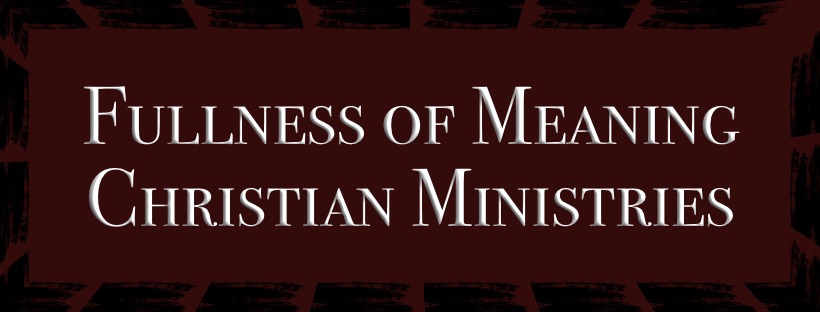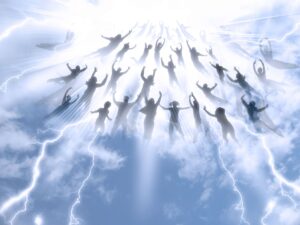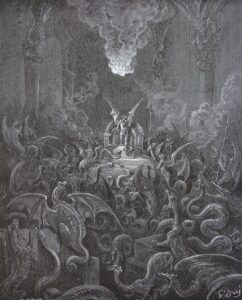In parts 1 and 2 we did a brief glimpse into the socio-linguistic aspect of the New Testament *vocabulary*. A more complex study pertaining to parts 1 and 2 can be obtained by studying the Paideia of the Christian youth in the first and second centuries.
The application of historical-morphological filtering of word meanings down to an “age” of “collective reasoning” is necessarily implemented in order to find Biblical “vocabulary agreement’. With this said, for sure the Greek New Testament’s social context could be viewed as heavily influenced by two forces: (1) Socially Naturalized verbal usage from Logographic/ Pictographic Proto-Armenian (Syunik) to Hittite, Proto-Georgian/ Kartvelian and Sumerian pictographic society …and, (2) the ingenious handling of Aristotle’s deductive syllogism and Plato’s agreement of particulars in motion to the fuller receptacle of itself. Such a view synthesized pagan predeterminism with Theistic determinism. It has hyper focused the question of ‘direction’ and ‘duration’ by which the associative words ‘move forward’ in a given society which would therefore be superimposed by a Deity. Simply put, Plato’s etymological treatments concerning Natural elements, their associative words and the evolution of their abstractions became a grammatical and etymological “theology”.
I might add a very interesting point of this study of historical morphology: The “abstract” nature of an ancient Sumerian, Chinese, Egyptian, Hittite, Indus Valley, pictograph was designated as ‘abstract’ due to the Thalian (Thales) approach (starting with Thales, ca. 586 B.C. {the year Judah was taken captive into Babylon}).
Herein lies the beginnings of ‘specific-STRUCTURE’ deduction – a.k.a. “probabilities” – “proving via ‘observation’ “ vs. ‘acting within the ‘genius’ or ‘joining’ of a community without the weariness of analysis. Such examples might be found contrasted in tribal communities. Such as a New Guinean tribe living within their own biosphere perfectly adapted to the genius of the trees, streams, water, food gathering, family life, etc…. Such a lifestyle is what we might call, NATURAL… or “nature”. Language is, on the other hand, “Abstracted” (‘taken from’ “off” + “structure” –”nature at its origins”) from its ‘root form’ of Natural elements such as “sky, tree, stream, dirt, earth, fire, wind, etc.”. To this, there is a ‘meeting ground’ for me that solidifies a verbal-social *semiosis* within the telegraphed (i.e., to that era studied) socio-verbal bank. One needs the other to exist, past needs present and visa versa. If you will, out of time ‘semiosis’.
One might delve into Aristotle’s Rhetoric, generatione et corruptione (coming to be and going away) and Plato’s Cratylus for a wonderful side study on word morphologies and the limitations of their interpretations, aka, ‘semiotics’. So beautifully found for me were the “Natural” elements were linguistically ‘abstracted’ into a combined STORY. They had to go somewhere. The Morphology of the Folktale is all about the natural becoming unnatural and the Morphology of the Folktale also brought about the FULFILLMENT of all things (aeon) in the fullness of time to a mythopoeic and then prophetically instanced culmination of pagan and Biblical agreements. In this ‘eye’ I see NO contradiction between the movement of pagan tales and Semitic prophecy.
I see no distance between Biblical archetypes found either in the Bible or in the Norse Volsung Saga, Greek myths, Rig Veda, etc…..only movements to agreement by force of LOGOS.
The Padeia of the early Greek words found their fulfillments in a Hellenized Christ figure. The origins of Greek Society were in their pagan poets such as Aeschylus, Sappho, Homer, etc….so, how could they be a mistake if the God of the Bible created ALL THINGS (—aeon–)?!?
Such Semitic archetypes, shadows, types, and prophecies did Christ Jesus fulfill! Such European and Hellenized archetypes did Christ fulfill as the Messiah versus the limited Hero. Jesus was and is the physical fountainhead by which all myths, folklores, etc. were pointing to. It was, and still is, the negative of the pagan’s sociatal “photograph” of the Hero that the Christ fulfills. More than this, the efforts of the pagan that ‘miss the mark’ for joy, selflessness, consistency and specific direction are ‘naturally’ painted without cognisance of the Christ. Christ TRULY fills in the MISS (the lacking of the pagan). Truly, if there is a historical Odin that walked around the backstreets of Norway or Iceland no historian wrote it down, only the poets and bards created the mythos. Did Krishna sit down to dinner with a local Indian community in Historical reality? I think not. All of these beautiful pagan stories allude with cultural color a Christ to come and the solidification of the Language, the LOGOS, by which the Greek Words in the New Testament submitted and took to their stations. It is within this ‘imaginative field’ of the fantastic do I digress for I know the literary genius of Tolkien in this world. Yet, even Tolkien was a Christian who believed in the ‘collective consciousness’ of all myths had a bearing of LOGOS to which other worlds could be generated. But, Tolkien’s focus was just that and by THAT he accepted the Trueness of the LOGOS and the power of its deployment upon all of the aons of our existence. This is why I stay within such realities writing this paper which are not ‘subcreated’ within a vacuum of humankind’s opinion, or technical ‘idiocy’—’viewed as one perceives’.
Lastly, the Greek New Testament should be read within the context by which the Christ was in agreement with the Greek myths/ Hellenized Paideia, Christian Paideia, The Greek Old Testament (LXX/ Septuagent), the great philosophers – Plato and Aristotle and our parent, the Hebrew Bible, by which YHVH revealed HIS RHEMA, DABAR, SHEM, and SHEKINAH that we may operate within the confines of His WORDS.





